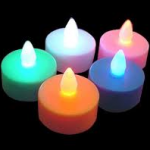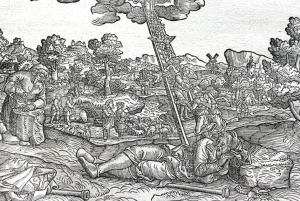 Ever heard a sermon titled, “Stop giving! We have more than enough!”
Ever heard a sermon titled, “Stop giving! We have more than enough!”
No?
Me neither.
That’s why the story of the tabernacle in the book of Exodus is entrancing. (No, I’m not kidding. Entrancing.) The tabernacle was a portable tent the Israelites could put up and take down, like an old-fashioned circus tent, a Bedouin bed-and-breakfast, of sorts, for God.
You may not see how entrancing this story is on a first read-through. The instructions on how the tabernacle should be prepared are tedious, a dreary inventory of materials, dry architectural blueprints and detailed plans for interior design—all put in writing (Exodus 25:1-31:11 and 35:4-33). So look again. The level of detail drives home the level of generosity that rose at the foot of Mount Sinai. All of what was made, constructed, woven, sewn, dyed, and overlaid came from the freewill offering—the calloused hands—of those whose hearts prompted them.
Notice that a minister or priest didn’t prompt them with an annual stewardship sermon. A famed preacher didn’t prompt them with constant cajoling. A non-profit charity didn’t prompt them with an endless stream of emails. Constructing the tabernacle wasn’t an obligation, a required task, a guilt trip. The tabernacle was the product of pure human desire:
The LORD said to Moses: Tell the Israelites to take for me an offering; from all whose hearts prompt them to give you shall receive the offering for me. (Exodus 25:1-2).
From gold, silver, linens and leathers, woods, oils, gems, and yarns, Israel made for God “a sanctuary, so that I may dwell among them” (Exodus 25:8). But only those whose hearts prompted them participated.
Nobody else had to because enough ordinary Israelites, run-of-the-mill people, former slaves, couldn’t be kept from bringing freewill offerings “every morning.” In fact, they gave so much that the artisans who did the actual construction told Moses, “The people are bringing much more than enough for doing the work that the LORD has commanded us to do” (Exodus 36:5).
Moses had to do something, and he did what no good leader ever does. He told them to stop giving.
Moses gave command, and word was proclaimed throughout the camp: “No man or woman is to make anything else as an offering for the sanctuary.” So the people were restrained from bringing; for what they had already brought was more than enough to do all the work.
Why this willingness? Why the eagerness to give, to build, to create? Why this moment when the coffers of ex-slaves and wilderness-wanderers were full? Why this protracted instance of sumptuous giving?
Why? Enter God’s spirit. At the heart of this lavish generosity lies leaders full of the spirit, the ruach of God. You probably won’t see all the references to the ruach in English because sometimes the Hebrew phrase “spirit of wisdom” is translated by the word, “skill,” but in the original Hebrew the spirit is there—choreographing, guiding, inspiring. Don’t be fooled by your translations.
Early on in the story, God says to Moses,
And you shall speak to all the wise of heart, whom I have filled with spirit of wisdom. (Exodus 28:3)
Later on, God says,
See, I have called by name Bezalel son of Uri son of Hur, of the tribe of Judah: and I have filled him with spirit of God, with wisdom, intelligence, and knowledge in every kind of craft, to devise artistic designs, to work in gold, silver, and bronze, in cutting stones for setting, and in carving wood, in every kind of craft. (31:1-6)
At the end of the story, the spirit is there again.
See, the LORD has called by name Bezalel son of Uri son of Hur, of the tribe of Judah; the LORD has filled him with (the) spirit of God, with skill, intelligence, and knowledge in every kind of craft, to devise artistic designs, to work in gold, silver, and bronze, in cutting stones for setting, and in carving wood, in every kind of craft. (Exodus 36:30-33)
We learn so much about the spirit—so much that is fresh, unfamiliar, inspiring and different from what we learn in the New Testament story of Pentecost or the list of spiritual gifts in Paul’s letter to the Corinthians or the fruits of the spirit in Paul’s letter to the Galatians. So much, in fact, that I’ve decided to spread out this story over several posts.
For now, today, to get a sense of this scene, imagine walking into synagogue on Saturday or church on Sunday only to find bouncers—big, bullish, Samson-sized men—in the back of the sanctuary, keeping you from bringing your offering. And as you pass the door to the sanctuary, there’s a sign posted with bold letters:
NO MAN OR WOMAN IS TO MAKE ANYTHING ELSE AS AN OFFERING.
Imagine that.












